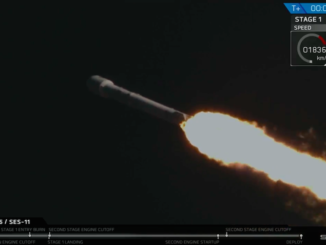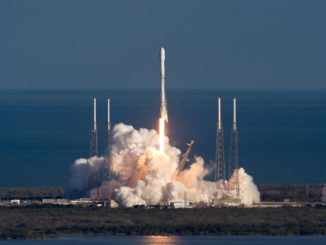
Nearly a year since its last mission in February, International Launch Services aims to resume commercial flights of Russia’s Proton rocket in late November with the Astra 2G communications satellite for SES.
The U.S.-based launch services company had to suspend commercial flights after a Proton launch failure in May. Satellites for the Russian government took precedence in the Proton manifest when the rocket was in service, forcing commercial payloads to wait for a ride into space.
With back-to-back successful launches since the May 15 rocket failure that destroyed a Russian telecom satellite, the Proton booster is set to return to commercial service with a launch scheduled for Nov. 27 for SES of Luxembourg, which owns the world’s second-largest fleet of satellites in geostationary orbit.
Industry officials said the Astra 2G satellite was ready for shipment next week from its Airbus Defence and Space factory in France to the Baikonur Cosmodrome in Kazakhstan for fueling and final launch preparations.
Liftoff on Nov. 27 is set for 2124 GMT (4:24 p.m. EST), according to Russian news reports.
Astra 2G’s launch will mark the 400th flight of a Proton rocket since the launcher debuted in 1965.
At least two more Proton rocket missions are planned after Astra 2G’s launch, said Karen Monaghan, a spokesperson for International Launch Services.
Monaghan did not say whether the Proton launches planned for December would be commercial flights under the auspices of ILS or would carry Russian government payloads under the management of the Khrunichev State Research and Production Space Center, the Moscow-based owner of ILS and prime contractor for the Proton rocket and Breeze M upper stage.
Based in Reston, Va., ILS announced in August it cut its workforce by approximately 25 percent in response to a lagging launch rate. Instead of seven or eight ILS Proton launches annually, ILS said it now targets around three or four.
The last ILS Proton launch in February successfully delivered the Turksat 4A satellite into orbit for a Turkish telecom company.
Two Khrunichev-managed Proton launches occurred in March and April before the botched launch of the Express AM4R communications satellite in May.
Investigators blamed the May launch failure on an anomaly in the Proton rocket’s third stage steering system that led to the premature shutdown of the third stage main engine.
The Proton rocket returned to flight status with the Sept. 27 launch of a Russian military satellite. Another Proton launch Oct. 21 deployed the Express AM6 spacecraft for Russia’s government-owned civilian satellite telecom operator.
Reliability woes with the Proton rocket and Breeze M upper stage have primarily afflicted launches with Russian institutional payloads in recent years.
Only one ILS Proton/Breeze M launch in the last six years has suffered a mishap, and the satellite aboard that December 2012 mission — Russia’s commercial Yamal 402 spacecraft — recovered and reached its planned orbit using on-board propellant.
In the same time period, five Proton/Breeze M flights had failures that destroyed their payloads or put them in the wrong orbit, with most of the issues attributed to process or manufacturing errors.
ILS officials have said they subject commercial Proton launches to an extra layer of scrutiny, offering their customers additional quality control measures to raise the chance of success.
Follow Stephen Clark on Twitter: @StephenClark1.



